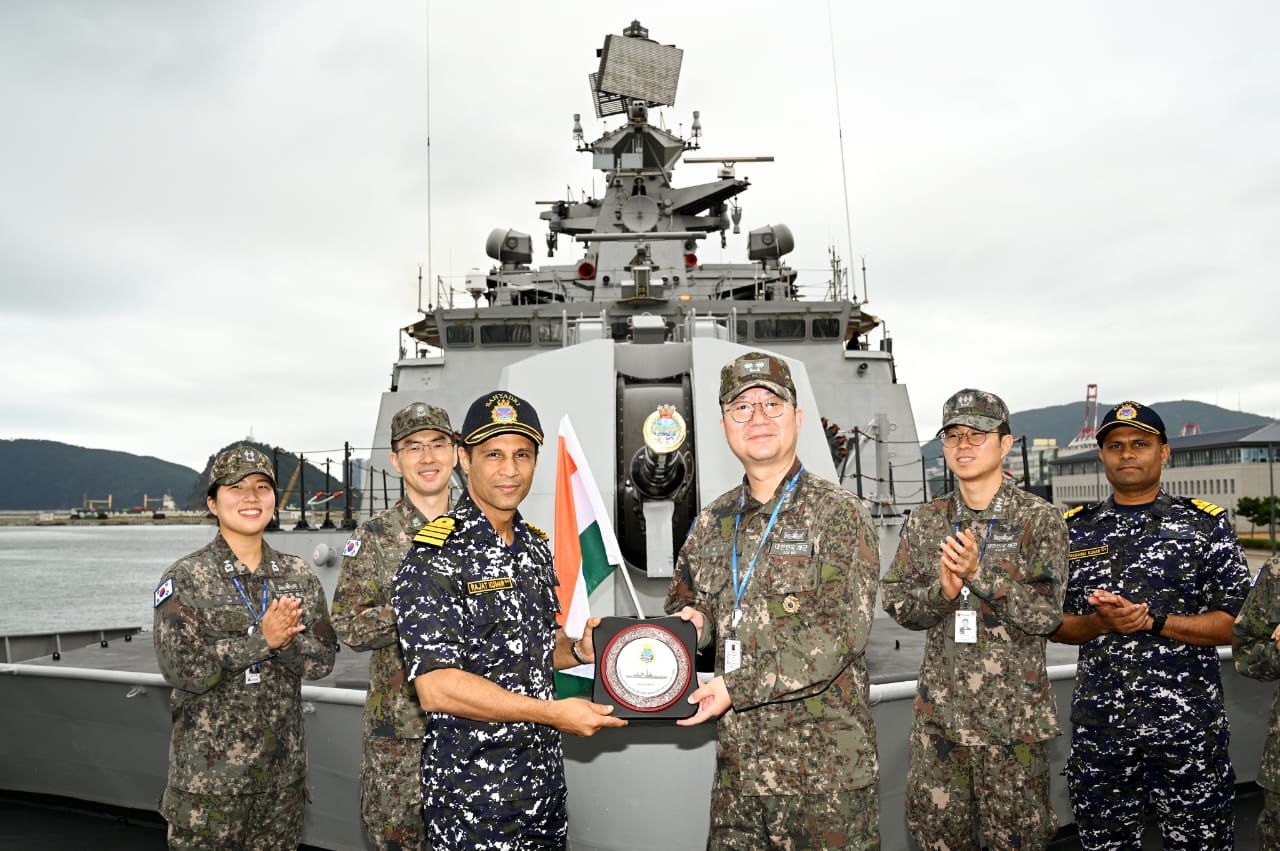India and South Korea Begin First-Ever Bilateral Naval Exercise in Busan

Busan, October 15: India and South Korea have launched their first-ever bilateral naval exercise, marking a new chapter in their growing maritime and strategic partnership. The joint exercise began on Monday at the Busan Naval Base and highlights the strengthening defence ties between the Indian Navy (IN) and the Republic of Korea Navy (RoKN). The Indian Navy’s INS Sahyadri, an indigenously built Shivalik-class stealth frigate, arrived at Busan on October 13 to take part in the inaugural exercise. The ship received a ceremonial welcome from the South Korean Navy, reflecting the warmth and mutual respect shared between the two nations. INS Sahyadri is part of India’s Eastern Fleet under the Eastern Naval Command, based in Visakhapatnam, and is currently on operational deployment across the South China Sea and the wider Indo-Pacific region. Built in India and commissioned in 2012, INS Sahyadri represents the spirit of the nation’s Aatmanirbhar Bharat (self-reliant India) initiative. Its participation in the exercise highlights India’s growing naval capabilities and commitment to regional stability through cooperation with like-minded nations. The India–South Korea naval exercise consists of two key phases — harbour and sea operations — designed to improve interoperability, coordination, and trust between the two navies. During the harbour phase, sailors and officers from both countries are engaging in cross-deck visits, professional exchanges, joint training, and friendly sports matches. The Commanding Officer of INS Sahyadri is also meeting senior officials from the Republic of Korea Navy and local dignitaries to further strengthen diplomatic and naval cooperation. In the next phase at sea, INS Sahyadri and ROKS Gyeongnam will conduct complex naval manoeuvres, tactical drills, and communication exercises to test and enhance operational coordination between the two forces. These activities aim to improve the ability of both navies to operate together in multi-threat environments, reinforcing their shared commitment to peace and stability in the Indo-Pacific. The Indo-Pacific region continues to gain strategic importance due to its economic and geopolitical significance. Both India and South Korea have emphasized the need for stronger maritime partnerships based on shared democratic values, freedom of navigation, and respect for international law. This exercise is a direct outcome of several years of planning, dialogue, and mutual visits between the two countries’ naval leadership. For India, the deployment of INS Sahyadri in the South China Sea and participation in this bilateral exercise demonstrate its commitment as a responsible maritime power and its role as a “Preferred Security Partner” in the region. For South Korea, this partnership reflects its growing interest in contributing to regional peace, stability, and open sea lanes of communication. The successful start of this exercise sets the stage for more advanced and larger-scale naval engagements between the two countries in the coming years. It also signifies a major step forward in building stronger defence cooperation under the broader framework of Indo-Pacific security collaboration, reinforcing both nations’ commitment to maintaining a free, open, and secure maritime environment. India and South Korea Launch First Bilateral Naval Exercise India and South Korea have begun their first-ever bilateral naval exercise at Busan Naval Base, marking a milestone in defence cooperation. INS Sahyadri, an indigenously built Shivalik-class frigate, is participating in the exercise, which includes both harbour and sea phases. Sailors from both navies are engaging in professional exchanges, joint training, and friendly sports matches, while complex sea manoeuvres will enhance tactical coordination. The exercise reflects growing strategic ties and shared commitment to regional security in the Indo-Pacific. It also showcases India’s role as a responsible maritime power and strengthens cooperation with South Korea for future joint operations.




